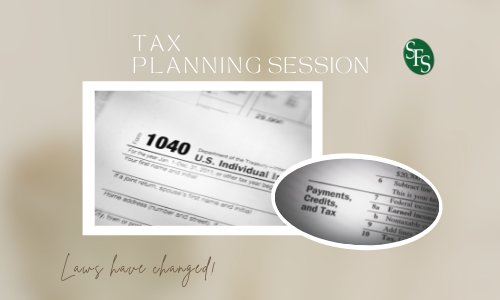Why do I need a tax strategy session? A year-end tax planning meeting with your Enrolled Agent (EA) is a must for many taxpayers, especially individuals who own a business. For the business owner, the purpose of the meeting is to clean up your books (if necessary). However, the underlying reason for the session is to project your tax liability for the current year. Your EA can make recommendations to reduce the amount of taxes that you will owe. Bottom line – a year-end tax planning meeting can save you money.
- You owed tax in 2020 – Having a surprising tax bill is never fun. So, if you owed taxes last year, project your current year obligation if you have not already done so.
- Your household income is over $150,000 single and $200,000 joint – However, as your income grows, so does your tax bill. A greater tax liability occurs because tax rates increase and tax benefits phase-out. This includes lower child tax credit amounts, increases in capital gains tax rates, higher income tax rates, Medicare surtaxes, and more.
- You are getting married or divorced – Unfortunately, the tax penalty for being married is higher than ever. Are you prepared?
- You have kids attending college next year – There are tax programs that may be available, such as the American Opportunity tax credit. You may wish to review your options and their impact on your tax return.
- You have a small business – There are depreciation benefits, qualified business deductions, and numerous small business tax credits to consider. A review is critical if you have a flow-through entity business taxed as a Sub Chapter S or partnership, be it an Incorporated entity or an LLC. These types of entities are taxed on your personal tax return. Many tax-saving strategies might be employed, such as:
-
- Identifying deductions
- Divesting assets that represent unrealized losses to offset capital gains
- Restructuring income
- Purchasing needed equipment earlier than planned
- Delaying the receipt of year-end payments from customers until early the following year
- Expediting the payment of expenses
- Contributing to qualified retirement plans –such as 401(k), 403(b), 457(b), IRA, and SEP
- Contributing to a religious organization or charity
- You plan on selling investments – Capital Gains tax rates can now range from 0% to 37% (or even higher with the Net Investment Tax).
- There are changes in your employer provided benefits – These changes could impact your taxable income this year.
- You buy, sell or go through a home foreclosure – Again, there are significant tax benefits within your home, but only if you know about them and plan accordingly.
- You have major medical expenses – It is more challenging than ever to itemize deductions. But one way it is possible is to itemize is if you have a major medical expense. When this happens, it is time to review ALL itemized deductions to minimize your taxes.
- You recently lost or changed jobs – Understanding the tax impact of unemployment benefits is crucial.
- You have not conducted a tax withholding review – To avoid under-withholding penalties, you need to ensure your withholdings are sufficient.
- Your estate has not been reviewed in the past 12 months – Recently passed estate laws and potential changes in these rules make an annual review a must.
There is still time to get your financial house in order before the clock tolls midnight on December 31. Contact us today online, https://go.oncehub.com/SFSTax or by phone, 772-337-1040.


